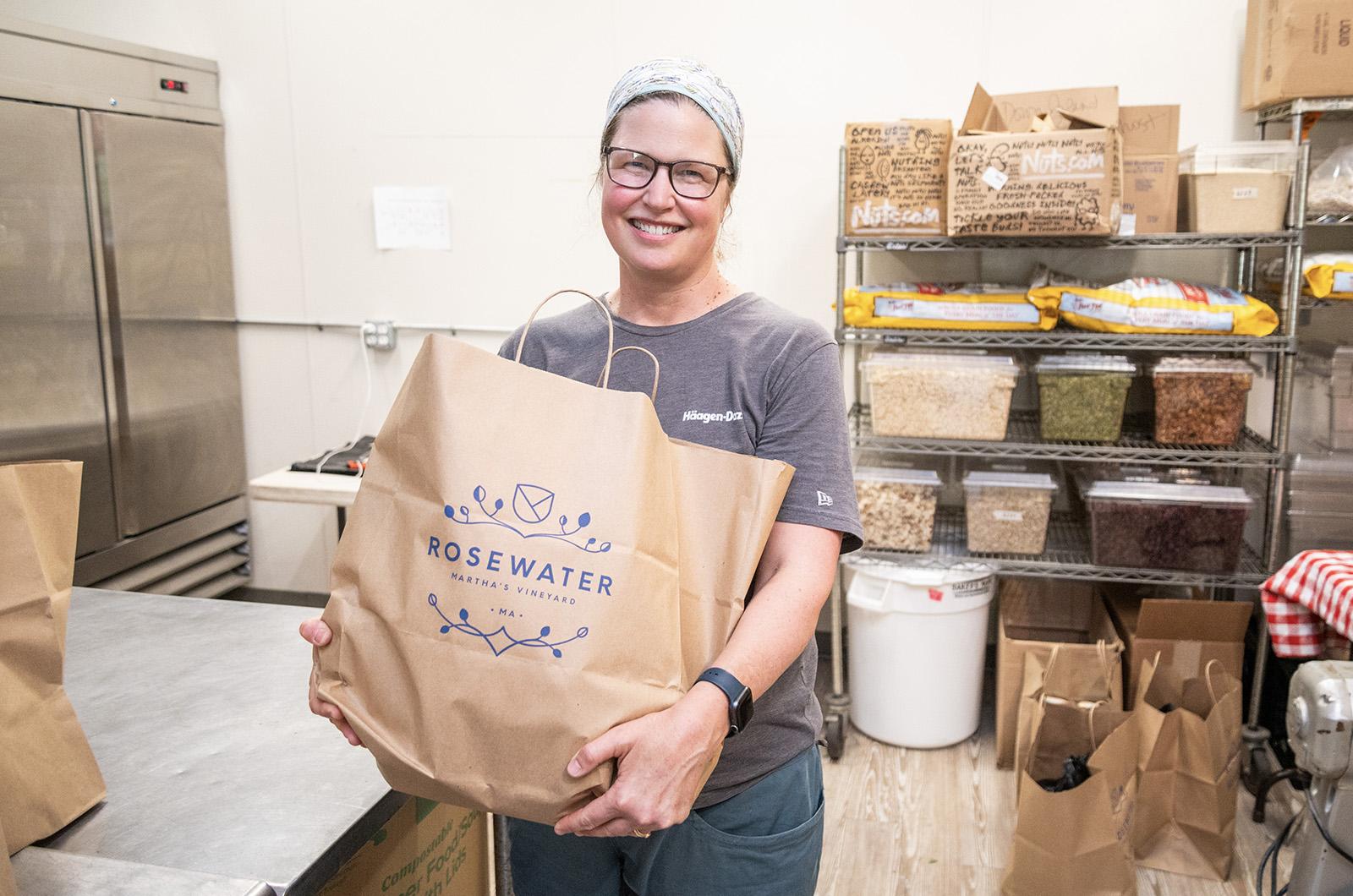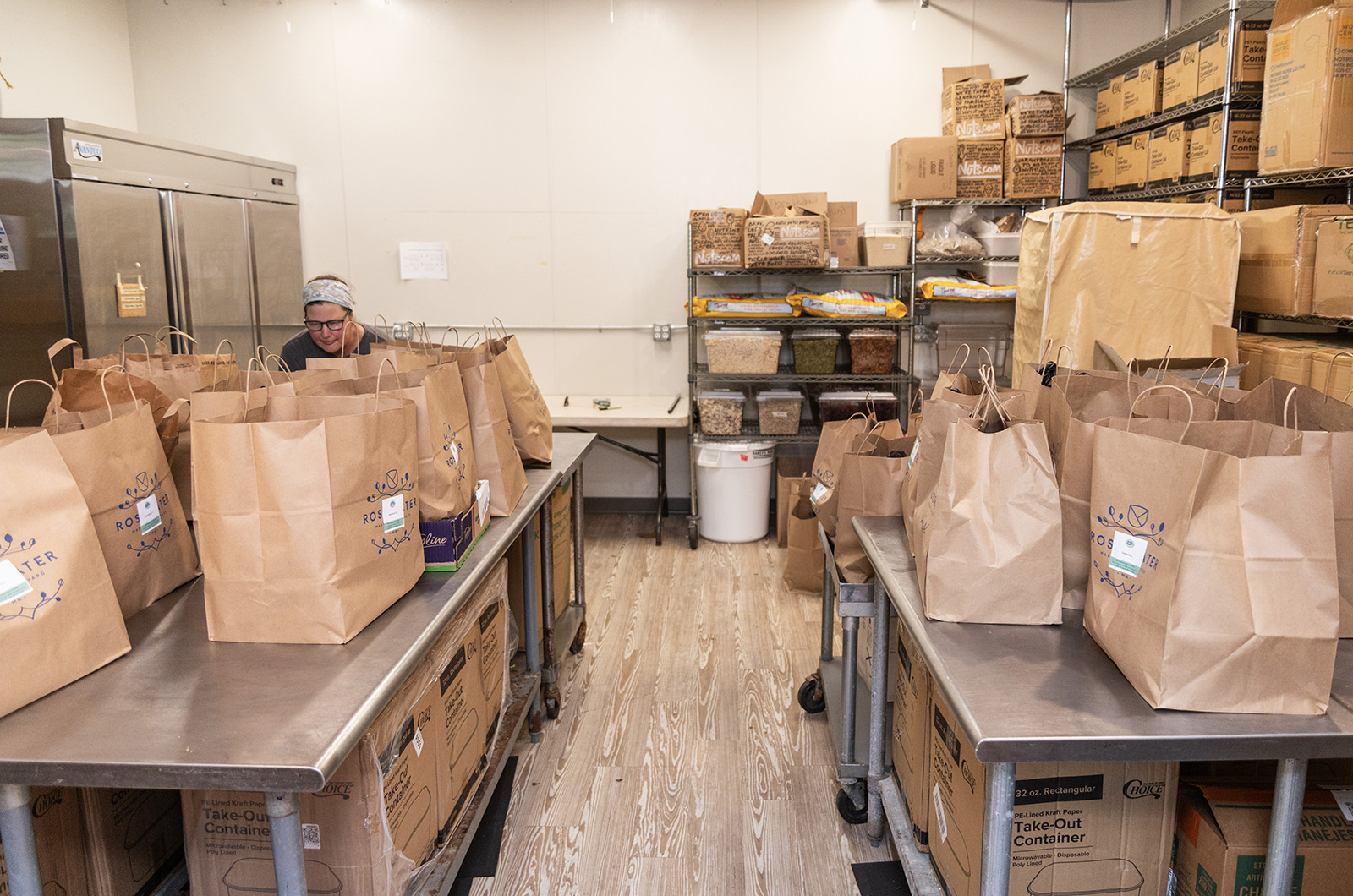When school ends for the summer so does the free lunch program available to the 2,170 public school students and 180 charter school students on the Island. The need does not end, however, as food insecurity continues to rise, with families having to commit the bulk of their salaries to skyrocketing housing costs.
For the past eight years, Island Grown Initiative (IGI) has filled this void through its Community Lunch program, offering free lunches to anyone who needs it all summer long. The organization expects to provide approximately 16,000 meals during the summer and school vacation weeks, said Merrick Carreiro, IGI’s director of food equity programs.
“The volume is challenging,” Ms. Carreiro said. “We have so many amazing volunteers who are here every day, a solid staff, but it’s still a lot of work to produce that much fresh food.”
According to the Martha’s Vineyard Community Foundation, the average Islander spends anywhere between 50 and 60 per cent of their earnings on housing, which puts a squeeze on a family's ability to afford food. High shipping costs also mean that Island consumers get less for their dollar than those on the mainland.
“Almost everybody who comes to us has a job or is newly arrived, and I think people would be surprised to hear that,” Ms. Carreiro said. “We have nurses, teachers, every profession. Because even if they’re working three or four jobs, their rents are just through the roof.”
This year, in addition to providing meals at various camps, summer schools, libraries and the YMCA, the organization has added a “meal kit” initiative that provides a full week of groceries to families in need. While meal kits are aimed at families who rely on free school lunch, anyone who feels they could benefit from the service can request a kit through IGI’s website. No proof of financial need is required.
Fifty-three families requested meal kits last week, and IGI filled the need within 24 hours.
A typical meal kit might include lunch meat, a loaf of bread, some pre-prepared meals and snacks such as fruit and yogurt. When someone orders a meal kit, they are asked to fill out a form with their food preferences, which are then entered into a spreadsheet by IGI employees and volunteers.
While similar programs may offer a week’s worth of pre-prepared meals, Ms. Carreiro said that the meal kit program allows families to nourish themselves on their own terms.
“There’s flexibility in that even if your child doesn’t want to have that sandwich that day, it’s not gonna sit cold in the fridge,” she said.
Community Lunch is just one of IGI’s programs to combat food insecurity. The organization also delivers pre-prepared meals to homes upon request, operates the Island Food Pantry and hosts a mobile market that accepts SNAP benefits. It’s school program also educates children on healthy eating and local farming.
Superintendent of schools Richard Smith said that nourishing the Island’s students takes a village. He’s grateful for the cafeteria staff at each of the schools for making state-funded free lunch possible during the school year. He said that during the summer, IGI is an invaluable partner to the school system.
“The people that work in our food service, and people doing the work at Island Grown, really are doing direct service and support to kids — I know families are grateful. Certainly I am,” he said.
Last month, the Healey-Driscoll administration introduced a summer EBT program that provides families of school-aged children with extra EBT dollars during the summer months. Summer EBT can be used wherever SNAP is accepted. The initiative is estimated to help feed over half a million children throughout the state.
But for Islanders, especially those who are ineligible for programs like summer EBT and SNAP, the pressure of food insecurity still weighs heavily. Natalie Poole, development and marketing manager at IGI, said that donations are vital to running the Community Lunch and other programs. She named the Couch Family Foundation and Cape and Islands United Way as two of the program’s major sponsors.
“Demand for services continues to rise, so we’re always seeking support for all of our programs,” Ms. Poole said.
With a lot of IGI’s pandemic-related funding possibly coming to an end, Ms. Carreiro emphasized that Vineyarders will need to work together to help keep the organization’s initiatives afloat.
“How we continue to provide quality, nutritious food for people facing food insecurity is the biggest challenge, and the community really needs to step up now, in a big way,” she said. “Once that Covid-related money runs out, the need is still gonna be there.”
For more information, visit igimv.org.









Comments
Comment policy »